I used to think I was pretty smart. That is, until I found myself at the grocery store at 11:30 at night because of a carton of milk.
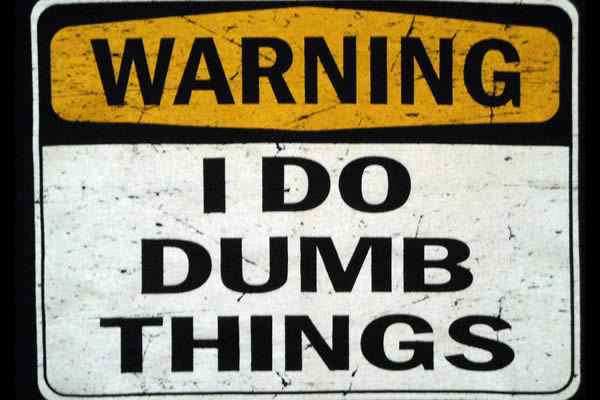
It turns out smart people do a lot of dumb things and there is a common reason why. I’ll explain below.
The milk
I’d just returned from a late night shopping trip. It was 11:15 at night and I was almost finished unloading the groceries when I discovered that the milk they’d sold me was expired. I immediately got into my car, despite being exhausted, and drove four miles back to the store.
All for $2.99 container of milk.
I never considered that this would take me 15+ minutes. Or that it would cost me valuable sleep. Or even that, in terms of gas and wear and tear on my car, that it would cost me approximately $2.25 to drive there. I would net less than one dollar. That’s $4 an hour, well below the minimum wage and certainly below what I was making at the time.
But I would show them! Justice would be done.
But why? What could make a rational person of at least average intelligence do such a dumb thing? And what does this have to do with changing the world or building a business or being a better leader at work and at home?
To understand the answer to both questions, we have to first acknowledge that we sometimes lose control. We feel stress, we get overwhelmed, or we feel threatened in some way, and BOOM! we shift from a controlled, thoughtful person to an irrational fool leaving his home at 11:15 at night to make a buck (literally a buck).
Secondly, we must understand the brain. Let’s look inside the brain for clues.
The brain in two parts
At it’s simplest form, the brain has two parts. I’m not referring to left side/right side, but rather the emotional part and the rational part. The quick-thinking, jump to conclusions part and the thoughtful, step-by-step part.
We all have some level of each part. Some have more of one part than the other. If you are familiar with the DISC profile, High D types have more of the first part (quick-thinking, “ready, fire, aim”) than High C types, who tend process things for longer (and longer…and longer…”ready, aim, aim, aim, aim”). Neither part of the brain is wrong, just as no DISC type is wrong, but both sides will get you in trouble if overused. Just as the emotional part of my brain landed me on a late night return trip to the store.
The oldest part of the brain
The quick-thinking, emotional part of the brain is the oldest part of the brain. It’s the part that said, “Lion approaching quickly. Run.” It didn’t think through escape routes, plot out the probability of survival or calculate the amount of oxygen required to run 1.5 miles at an average pace of 9 MPH with a temperature of 82 degrees and a relative humidity of…CHOMP, High C’s died in the wild. Perhaps this micro-evolution is why women are more rational than men. (There, I admitted it)
The quick-thinking, emotional part of the brain was necessary for survival. Even though we don’t have lions chasing us today, this part of the brain can still kick in when we least need it, just as it did for me.
Emotional hijacking
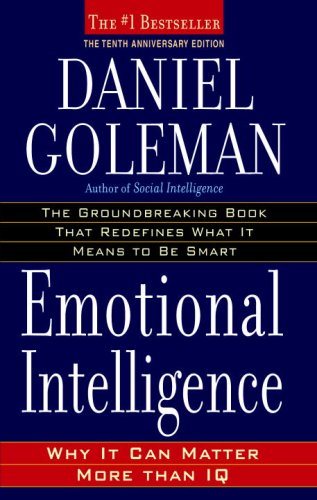
What exactly does all of this have to do with our performance at work, our leadership, or changing the world? Good question. I’ll let Psychologist Daniel Goleman answer that.
In his book, Emotional Intelligence (buy it, seriously – affiliate link), Goleman explains how small stresses in life pile up over time. A problem with your house, a nasty co-worker, a flat tire, a bad hair day, your son needs braces you can’t afford, and on an on. They pile up until…that oldest part of the brain takes over. One small misstep or annoyance sets you off.
Losing control
When you are overcharged $5 on a bill or a team member is an hour late with a report and you jump down someone’s throat, you might say that you “lost control.”
But, in reality, the oldest part of your brain was in control. As Goleman points out, professional stress is the modern-day equivalent of the lion attacking in the wild. You react in the same way.
So we’re completely irrational, primitive-brained neanderthals, right?
Yes.
But that doesn’t mean we’re hopeless or that we should abandon all reason. Here’s a three step process to overcoming the primitive brain. It will help you stop doing dumb things when you know better. It’s the same process I am going through right now…and likely will be for life.
1. Awareness
Identify your triggers. What “sets you off” and leads you to irrational decisions?
- Injustice.
- Insults.
- Pain.
- Stress.
- Fear.
All of those are common reasons. More specifically though, it might be:
- Television news.
- Talk radio.
- Certain family members.
- Old friends.
- Social media.
- Rush hour traffic.
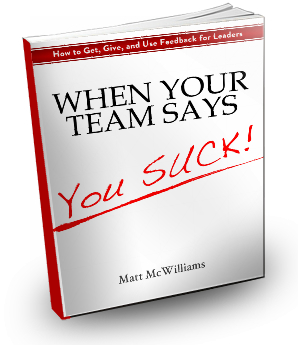
If you’ve always responded to bad economic reports by selling off all your stock only to later regret it, then television and radio news is a trigger for you.
Awareness is the first step and is key to the process.
2. Pick ONE thing to correct
Pick only one thing to correct at a time. Set one goal at a time. That’s it.
Focus on that one single thing until it is fixed.
For you, this might sound like, “Today, I will not yell at someone who works for me.” And then do that for two months. That’s all you get to work on for those two months to improve your behavior at work.
That’s exactly how I worked on being a better leader years ago. If you’re interested in the full version of on how I sought feedback and became a better leader, check out my free e-book, When Your Team Says You Suck.
If the news is your trigger, your goal is two months of no news. That’s it. I can guarantee you that in those two months, you will not make any irrational decisions based on an idiotic news reporter.
|
|
3. Work at that one thing
Once you have identified the trigger and developed a course to correct it, focus on that intensely for two months. Or at least 28 days.
Resist the urge to add more goals or to start working on other faults. Focus on this one thing until it is no longer a concern. For some, that might be 28 days. For others, it might be years.
Don’t set a timetable and give yourself time to reach the goal.
Bonus tip: When you do slip up, give yourself grace. You are, after all, fighting thousands of years of biology here.
What’s a trigger for you? What causes you to make decisions or do things you know are wrong?
Download print-friendly PDF version of this post to share
Questions?
Text me anytime at (260) 217-4619.
Or…check out some of my free reports to help you get on the right track:
 |
 |
 |
 |
 |
 |
 |
 |
 |




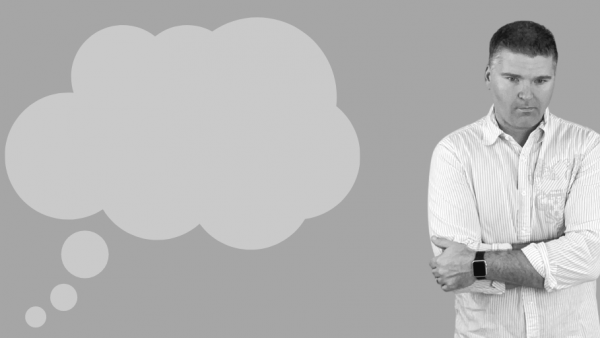
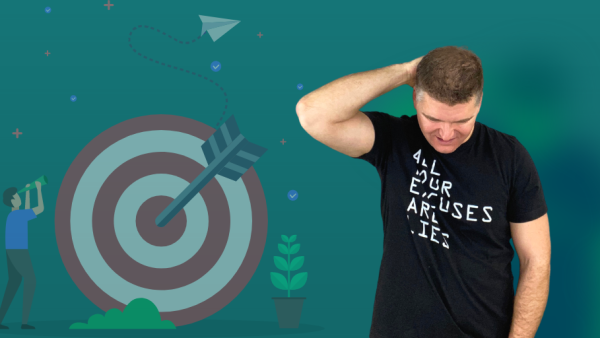
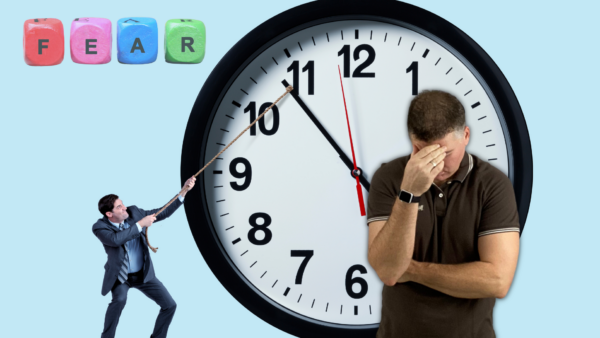

Great post Matt. When a bunch of decisions need to be made I just start knocking them out even when it is ridiculous. It is almost as the pressure of a lot of different things make me want to just get them out of my life.
I’ve found that when you have to make 10 decisions, if you just make one, the next 9 are exponentially easier.
Yeah I just need to make it instead of trash it;)
Thanks for starting out my morning with a thought provoking post. A big trigger for me is clutter. A challenge with two small children and one messy husband. I notice that if there is a lot of clutter/mess, I get really snappy and edgy. I feel overwhelmed. It impacts my interactions for my business and personal life. Another big trigger is social media. Working on limiting my time on that one. I eliminated news once I had kids. I couldn’t take the heartbreak or the stress
Good for you on the news!
I am the same way with clutter. I need to get back in the habit of always cleaning my office on Friday afternoons.
Pick one thing. Aye, there is the rub! But I will try, Matt, I will try!
Try picking an anchor habit. It’s the one habit change, that if made, might just be the anchor for others. It can cause a snowball effect.
Your milk story reminds me of the times I would drive 10+ miles just to save 5 cents on a couple of gallons of gas. The time and effort to get it never made sense!
I’ve never understood people’s obsessions with gas prices. I never hear anyone obsess about internet, books, or even most food prices. But when gas goes up 50 cents a gallon, people go crazy…even when they only use a half gallon a day.
I really like the idea of picking 1 thing to correct. I think many change efforts fail because we try to fix everything that needs improvement and once, and we become overwhelmed.
Although it is wordy, especially early on, you might want to check out “You are not your brain.” I am part-way through reading it. It discusses our auto-thoughts, which lead to automatic feelings in our body … both of which might be incorrect for the actual situation.
Then it gives a lot of info on how to capture these auto-thoughts and subdue them by our conscious mind. You give the first part, awareness, but they go a lot further. Long winded, not as straightforward as I would like, but well worth reading.
This book here? http://amzn.to/TRnxVz
Great post! I too will go back to the store but luckily it’s just down the street. Waiting in line or in traffic used to be a trigger for me but now I have learned to enjoy the downtime. I can choose to either stress about it (not productive) or look at it as an opportunity to slow down and get a few minutes to just be still (productive).
Sounds like me with the traffic. I used to get incredibly angry but now I really do better with leaving earlier and, quite frankly, I appreciate the extra minute or two. My commute to my office is usually 12-13 minutes. Make it 15-16 and I can knock out a 30 minute podcast in one day’s commute. Silver lining!